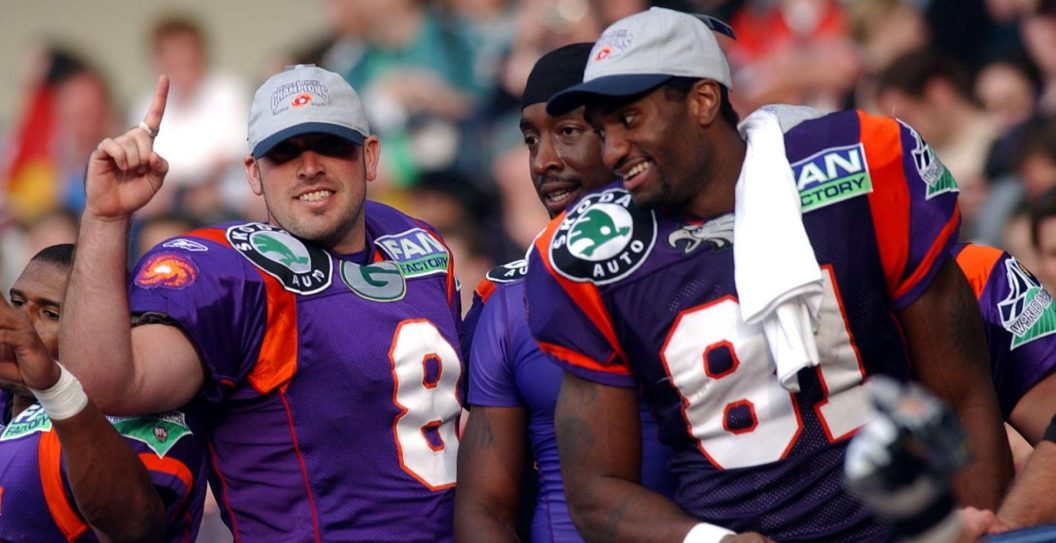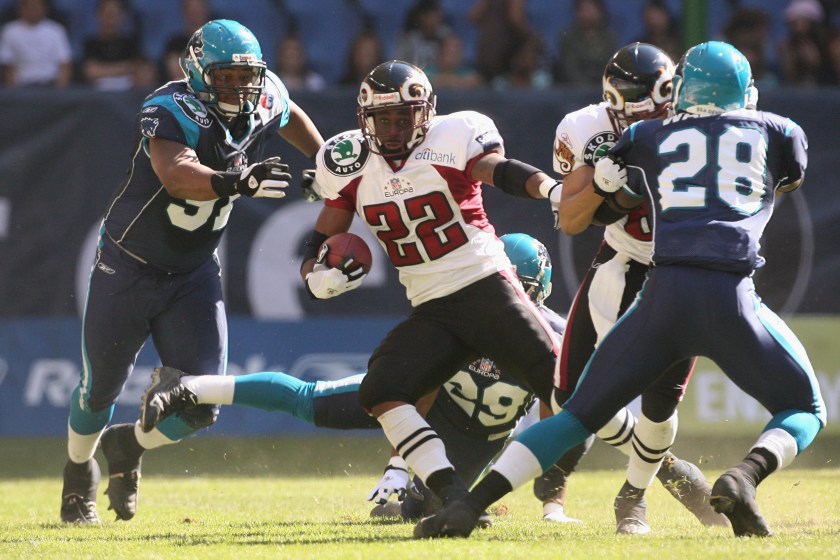The NFL will make a triumphant return to Frankfurt, Germany, on Sunday as one of the biggest games of the season is set to unfold where the final game of the final NFL Europe season took place 16 years ago.
When Patrick Mahomes, Travis Kelce and the Kansas City Chiefs take on Tua Tagovailoa, Tyreek Hill and the Miami Dolphins, Frankfurters will get the chance to see some of the sport's brightest stars take the field.
"They had a tremendous fan base in Frankfurt," NFL Network analyst Brian Baldinger told FanBuzz by phone ahead of Sunday's NFL return to Frankfurt. "That will rival any NFL game. It was like a World Cup atmosphere, to be honest with you."
The contest, with major playoff implications, will be staged nearly two decades after the city played host to one of the best teams in what was once hailed as one of football's top developmental leagues.
Baldinger was on the call for what wound up being the final game of NFL Europe, as the Hamburg Sea Devils downed the Frankfurt Galaxy 37-28 in World Bowl XV.
That season — the 15th of the most recent attempt to place an entire league oversees — was ahead of its time in a lot of ways. Before shuttering, NFL Europe gave rise to the likes of Hall of Fame quarterback Kurt Warner, Jake Delhomme, All-Pro linebacker James Harrison, and Super Bowl-winning kicker Adam Vinatieri, among others.
"It was great," Baldinger said of the league. "It was just a great training ground, for everyone. It was a chance for players to prove that they could play. ... There were a lot of guys now running training rooms across the NFL who were over there, PR departments that were over there. It was a great run. The fans were phenomenal, especially throughout Germany. We all look back on it with great memories."
When 35,000 fans pack into Deutsche Bank Park on Sunday, they'll do so amid continued calls to place an NFL team in London — and during a time where spring football is becoming a mainstay on television networks on the other side of the pond, in the United States.
Why Did NFL Europe Fail?
So why did NFL Europe fail back in 2007? Why haven't efforts been made to revive the league, alongside the likes of the XFL, as a developmental league for the NFL — and provide an opportunity for European fans to get an up-close look at the stars of tomorrow who might one day take the field in international showcases such as Sunday's game?
"It made no sense that it folded," Baldinger lamented. "It made no sense. Because, it kept getting better and better. It was a great opportunity for the coaches and everybody involved. The officials loved it, because they had a chance to get guys elevated, trained as referees, cross-train them at different positions. It was greed. It was costing some teams half a million dollars per year. But you could find a LeRoy Glover [in that league]; tons of great players came out of there who got the opportunity that they needed."
One of the biggest reasons for the league's decline is that at the time, the caliber of play couldn't match the NFL's product on Sundays in the fall.
But in the recent past, there has been a varying degree of success when it comes to spring football in the United States. The Alliance of American Football shut down in 2019; and the original version of the WWE's XFL entered with a bang in 2001 and exited with a whimper later that year.
Meanwhile, the latest version of the XFL is the closest thing, besides college football, that the NFL has ever had to an official developmental league since the closure of NFL Europe. Baldinger believes something significant was lost after that final World Bowl.
"Especially now, with how little time teams have to practice, or train, or get ready [for the season]," he said. "They had the chance to go through training camp, practice every day, and you found out the kids who were mature, were immature, and wouldn't spend your time with the immature kids. It's just unfortunate how it ended."
Like most things, losing NFL Europe came down to money. Or lack thereof.
Given this country's seemingly insatiable appetite for football, for the ability to gamble on football, and the league's unending player development quest, it becomes fair to wonder if it might one day be more feasible to take another shot at creating a European league rather than establishing a franchise in London, or Frankfurt or Munich.
"They could put a league back over there," Baldinger said. "If they wanted to. It just kept getting better and better. The conditions kept getting better, the travel, the food.
"I don't know if they have the logistics figured out to have a single team based over there, or how they'd handle things. ... I think it would wear the players and coaches and the fans out if they tried doing something like that."
At the time of the league's closure, the NFL announced that a major factor in the decision was that the European league had generated $30 million in annual losses.
But in the 15 years since World Bowl XV, the NFL has established a footprint across England, Germany and throughout Europe by staging a handful of regular-season games internationally each season. It's evident that fans have welcomed the sport back with open arms, thanks in part to the atmosphere of those NFL Europe games from 1995 through 2007.
The 36 International Series games that have been staged primarily in London have averaged well over 80,000 fans, underscoring the passion and interest that European fans have for the sport.
This Sunday, those fans will have the chance to experience the best that the NFL has to offer.
"The fan bases were tremendous," Baldinger recalled. "They were growing throughout Germany, Scotland was good, Amsterdam was good. But, to be honest with you, it made no sense to shut it down."


